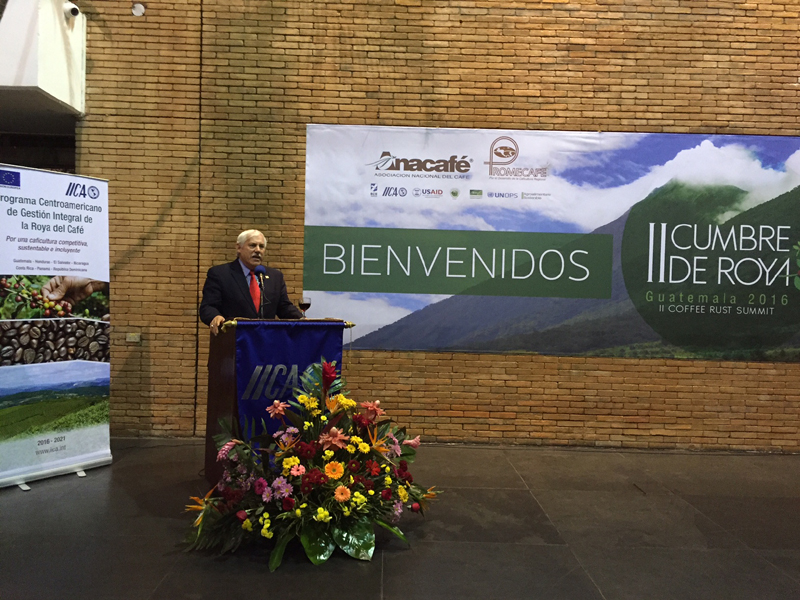IICA and the EU launch program to address the effects of coffee leaf rust on Central America and the Dominican Republic

Guatemala, 26 February 2016. The Inter-American Institute for Cooperation on Agriculture (IICA) and the European Union (EU) officially launched the Central American Program for Comprehensive Management of Coffee Leaf Rust during the formal inauguration of the Second Regional Summit on Coffee Leaf Rust, held on February 24 in Guatemala City.
This regional initiative seeks to ameliorate the socio-economic situation being faced by the coffee growing sector in Central America and the Dominican Republic following a severe coffee leaf rust outbreak that has impacted coffee production since 2012. The program also hopes to contribute to rehabilitating regional coffee production and fostering production models that are more sustainable from an economic, social and environmental standpoint.
This new program will be implemented at the regional, national and local levels until 2021 using funds totaling 16.5 million euros, of which 15 million were donated by the EU as non-refundable aid. The program will be carried out in El Salvador, Guatemala, Honduras and Nicaragua, and in four specific regions in those countries at the local level.
The opening ceremony and official program launch were attended by Darwin Rodney Ramírez, Deputy Minister of Agricultural Health and Regulations of Guatemala; Kenny Bell, EU Ambassador to Nicaragua, Panama and the Central American Integration System (SICA); Víctor M. Villalobos, Director General of IICA; Jorge Ulloa, President of PROMECAFE; Miguel Medina, President of ANACAFE; Fernando Quevedo, IDB Representative in Guatemala; Matthias Sonn, German Ambassador to Guatemala; and Todd Robinson, U.S. Ambassador to Guatemala, among other authorities.
Being able to participate in this summit by sharing the great news of the start of such an important regional program is very important to the EU. We hope the program will be a useful and effective tool for reducing the incidence of coffee leaf rust and, in turn, maintaining and increasing employment opportunities and food security for the most vulnerable communities in the region, stated Ambassador Kenny Bell.
According to Villalobos, the program will contribute to helping the regional coffee production sector to recover from the coffee leaf rust outbreak through the implementation of adaptation, mitigation and risk reduction strategies for dealing with climatic disasters. It is also a part of IICA’s historic commitment to fostering the modernization, improvement and sustainable development of coffee production in its member countries.
Incidence of coffee leaf rust
The Central American Program for Comprehensive Management of Coffee Leaf Rust hopes to strengthen the coffee-growing sector’s institutional framework in terms of policies as well as applied research, to develop an effective early warning system, and to facilitate the adoption of adaptation, mitigation and disaster risk reduction measures. Through these actions, the program seeks to improve living conditions for coffee-growing families.
The adoption of these measures could contribute to reducing abrupt coffee losses like those that occurred in 2012 and 2013, when 2.7 million bags of coffee were completely lost to coffee leaf rust in Central America and the Dominican Republic, representing 20% of the total coffee production and causing a severe socio-economic impact.
The Tropical Agriculture Research and Higher Education Center (CATIE), the Agricultural Research Center for International Development (CIRAD), the Executive Secretariat of the Central American Agricultural Council (SECAC), the German Agency for International Cooperation (GIZ), and the Regional Cooperative Program for the Technological Development and Modernization of Coffee Production (PROMECAFE) are some of the strategic partners that will be assisting IICA throughout the program’s execution.
More information: